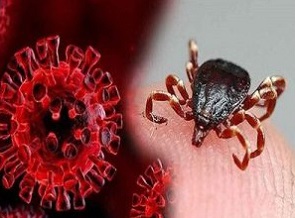Outbreak News: Doctor Dies From Crimean-Congo Haemorrhagic Fever Virus While Five Other Doctors Are Among The Latest Eight Infections In Pakistan!
Nikhil Prasad Fact checked by:Thailand Medical News Team Nov 06, 2023 1 year, 5 months, 2 weeks, 15 hours, 3 minutes ago
Outbreak News: In a devastating turn of events, a young doctor has succumbed to the deadly Crimean-Congo Haemorrhagic Fever (CCHF) virus in Quetta, Pakistan. Another 5 more doctors were among th latest 8 new cases identified in the last 48 hours in Quetta. This tragedy has sent shockwaves through the medical community, resulting in a high alert being issued in hospitals and medical centers across the Balochistan province in Pakistan.

The outbreak of the Congo virus has already claimed 17 lives in the region this year, with 16 healthcare professionals, including doctors, testing positive for the virus. This alarming situation calls for a comprehensive response to contain the outbreak and prevent further casualties.
The Emergency Alert in Quetta Hospitals
The grim reality of the Congo virus outbreak became painfully evident as a high alert was declared in Quetta's hospitals and medical centers following the death of a young doctor. Abdullah Khan, the Secretary of the Health Department, confirmed the virus's toll, emphasizing that 17 lives had already been lost in the Balochistan province this year. The emergency alert was issued after it was discovered that 16 healthcare professionals, including doctors, had contracted the virus.
According to local
Outbreak News coverages, initial cases were reported at the Civil Hospital in Quetta, where three doctors, including two females, were diagnosed with the Congo virus. Subsequent testing revealed an additional 13 infected healthcare professionals at the Civil Hospital and the Fatima Jinnah Medical Centre. Due to the critical condition of these patients, they were urgently transported to Karachi for treatment, with some being flown via air ambulances, while others were sent by road.
Dr Shakarullah Baloch, one of the critical patients, tragically passed away in Karachi, and the two female doctors remained in critical condition. The infected healthcare professionals were also providing medical care in various hospitals and medical centers, further raising concerns about potential transmission.
Containment Efforts and Public Awareness
Health officials acted swiftly to contain the outbreak, with attendants of patients who had visited trauma centers also being tested for the virus. They were strongly advised to refrain from visiting the center to prevent further transmission. The virus is typically transmitted to humans through tick bites or contact with infected animal blood or tissues during and after animal slaughter. In rare cases, human-to-human transmission can occur through close contact with the body fluids of an infected individual.
The symptoms of the Congo virus include high fever, headache, vomiting, diarrhea, body pain, and stiff neck. With these symptoms in mind, public awareness campaigns have been launched to educate the local population about the importance of taking preventive measures, such as using insect repellent and practicing good hygiene, especially when dealing with livestock.
The Ongoing Threat and Additional Infections
As the outbreak continues, new infections continue to surface. In a
shocking development, eight more cases of the Congo virus were reported in Quetta, with five of them being doctors. This concerning trend has raised alarms not only within the medical community but also among the general population.
Meanwhile, a new and mysterious pathogen has emerged in the intensive care unit of a government hospital in Quetta, adding to the healthcare crisis in the region. Sixteen medical staff members have been affected by this unknown pathogen, which exhibits symptoms such as sudden severe body pain, high fever with stiffness and chills, mild respiratory symptoms, decreased platelet count, and lymphopenia. The highly contagious nature of this pathogen has prompted immediate action by health authorities.
Preventive Measures and Testing
Amid these dire circumstances, authorities are taking every possible measure to prevent further infections. The Department of Health's Integrated Health Monitoring and Emergency Response Team has initiated a thorough investigation to understand the source of the outbreak and formulate a comprehensive plan to manage and contain it.
The Fatima Jinnah Hospital in Quetta has implemented stringent testing protocols, screening all 18 medical and non-medical staff members for the presence of the Congo virus. Out of these, five doctors and three non-doctors have tested positive for the disease, underscoring the urgency of the situation. Containment efforts are underway, with the hospital staff working closely with health authorities to ensure a swift and effective response.
Conclusion
The Congo virus outbreak in Quetta-Balochistan is a dire public health crisis that demands immediate attention, as it continues to claim lives and infect healthcare professionals. The rapid spread of this deadly virus, coupled with the emergence of a new and mysterious pathogen, underscores the need for a coordinated and comprehensive response to safeguard the health of the local population.
Efforts to educate the public about preventive measures and the importance of early detection are crucial in curbing the outbreak's expansion. Health authorities must work tirelessly to identify the source of the outbreak, establish effective containment strategies, and provide the necessary medical care to those affected.
The situation in Quetta-Balochistan serves as a stark reminder of the ever-present threat of emerging infectious diseases and the importance of robust healthcare infrastructure and preparedness to combat such challenges.
For the latest
Outbreak News, keep on logging to Thailand Medical News.
